 Have you ever known someone who took traffic signals personally?
Have you ever known someone who took traffic signals personally?
You would probably judge them insane.
This is exactly what life does to us. It tells us to come to a stop here. An intersection is blocked or a particular road is rerouted through an inconvenient detour. We can’t argue or yell this problem away. (Just to let you know, I’ve tried this. It doesn’t work!)
We simply accept it.
Once you distinguish between the things up to you, and the things that aren’t (ta eph’hemin, ta ouk eph’hemin, Translation: What is up to us, what is not up to us.), you discover it comes down to something you don’t control.
You’ve got only one option: acceptance.
This is not the same thing as giving up. This has nothing to do with action—this is for the things that are immune to action. (Which is why this is the WILL, not the second step, of the Discipline of Overcoming Obstacles, Act, Step #2 is for our next blog.)
It is far easier to talk of the way things should be.
It takes toughness, humility, and WILL to accept them for what they actually are.
It takes a real man or woman to face necessity.
I believe, as stoics do, all external events can be equally beneficial to us because we can turn them all upside down and make use of them.
They can teach us a lesson we were reluctant to learn.
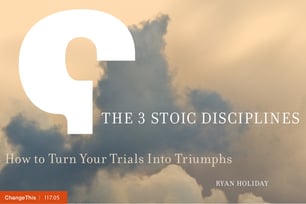 The will is the critical third discipline in Overcoming Obstacles from Ryan Holiday’s The Obstacle Is the Way: The Timeless Art of Turning Trials into Triumph.
The will is the critical third discipline in Overcoming Obstacles from Ryan Holiday’s The Obstacle Is the Way: The Timeless Art of Turning Trials into Triumph.
We can think, act, and finally adjust to a world that is inherently unpredictable.
The will is what prepares us for this, protects us against it, and allows us to thrive and be happy in spite of it.
It is the most difficult of all the disciplines. It’s what allows us to stand undisturbed while others wilt and give in to disorder. Confident, calm, ready to work regardless of the conditions. Willing and able to continue, even during the unthinkable, even when our worst nightmares have come true.
Facing Uncertainty
This blog is dedicated to one of my customers. As a college student, he loved to attend classes on the stoic Euripides'. When I shared this blog with him, along with comments about his ability to confront adversity, including the recent loss of his mother, his struggles with his father fading memory, and tragedy at the Marjory Stoneman Douglas High School in Parkland, FL., he simply brushed it off as nothing. Others he noted have faced worse struggles. He exemplifies this stoic discipline of the Will.
Modern technology gives us the false sense of conceited delusion we control the world around us. We’re convinced we can now, finally, control the uncontrollable.
It is not true. It’s highly unlikely we will ever get rid of all the unpleasant and unpredictable parts of life. One needs only to look at history to see how random, vicious and awful the world is. The incomprehensible happens all the time.
Overcoming Obstacles
Overcoming obstacles is a discipline of three critical steps. It begins with how we look at our specific problems, our attitude or approach; then the energy and creativity with which we actively break them down and turn them into opportunities; finally, the cultivation and maintenance of an inner will that allows us to handle defeat and difficulty.It’s three interdependent, interconnected, and fluidly contingent disciplines: Perception, Action, and the Will.
Because of my customers inspired, consistent, and languishing efforts to deal with personal challenges, I decided to jump over Action, as the next step to overcome obstacles, and share The Will with you and how he and others achieve this discipline.
THE WILL and WILLPOWER
Let’s begin by defining: WHAT IS WILL?
Ryan Holiday’s definition from The Obstacle is the Way: Will is our internal power, which can never be affected by the outside world. It is our final trump card. If action is what we do when we still have some agency over our situation, the will is what we depend on when agency has all but disappeared. Placed in some situation that seems unchangeable and undeniably negative, we can turn it into a learning experience, a humbling experience, a chance to provide comfort to others. That’s will power.
We’ve shared Willpower Blogs before:
- Willpower Rules Your Performance
- LIE #4 – Willpower is Always on Will-Call
- Work Longer – Make Poor Decisions
- The Truth About Discipline, Habit, and Willpower
These blogs are about the use of willpower to succeed with your energy, your focus. Understanding your limited supply of willpower, how to use it best, and schedule your day for when you have the most willpower.
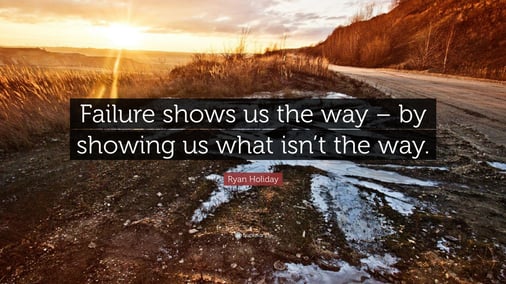 Holiday’s definition is more about a mental state, a discipline of your mind. A discipline every leader needs to utilize. If you don’t have it, you need it.
Holiday’s definition is more about a mental state, a discipline of your mind. A discipline every leader needs to utilize. If you don’t have it, you need it.
Your will needs to be cultivated. You must prepare for adversity and turmoil, we must learn the art of acquiescence and practice cheerfulness even in dark times.
Too often people think WILL is how bad we want something.
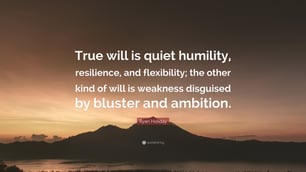 In actuality, the WILL has a lot more to do with surrender than with strength. As Holiday suggests, “Try “God willing” over “the will to win” or “willing it into existence,” for even those attributes can be broken.”
In actuality, the WILL has a lot more to do with surrender than with strength. As Holiday suggests, “Try “God willing” over “the will to win” or “willing it into existence,” for even those attributes can be broken.”
True WILL is quiet humility, resilience, and flexibility; the other kind of will is weakness disguised by bluster and ambition. See which lasts longer under the hardest of obstacles.
Abraham Lincoln’s Will
As celebrated and honored as Abraham Lincoln is, he suffered periods of intense brooding, isolation, and pain. Inside, he struggled to manage a heavy burden that often felt impossible to lift. In today’s world, he would have been described as experiencing depression. In his time it was not considered a mental disorder. It was classified as melancholy.
Lincoln learned to endure all his sufferings, articulate it, and find benefit and meaning from it. When you understand this about Lincoln you understand the key to the man’s greatness.
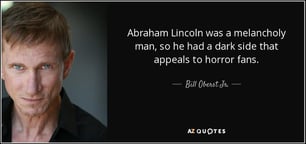 In the Obstacle is the Way, Holiday describes Lincoln and his WILL: Lincoln’s life was defined by enduring and transcending great difficulty. For most of Lincoln’s political career, slavery was a dark cloud that hung over our entire nation, a cloud that portended an awful storm. Some ran from it, others resigned themselves to it or became apologists, most assumed it meant the permanent breakup of the Union—or worse, the end of the world as they knew it.
In the Obstacle is the Way, Holiday describes Lincoln and his WILL: Lincoln’s life was defined by enduring and transcending great difficulty. For most of Lincoln’s political career, slavery was a dark cloud that hung over our entire nation, a cloud that portended an awful storm. Some ran from it, others resigned themselves to it or became apologists, most assumed it meant the permanent breakup of the Union—or worse, the end of the world as they knew it.
It came to be that every quality produced by Lincoln’s personal journey was exactly what was required to lead the nation through its own journey and trial. Unlike other politicians, he was not tempted to lose himself in petty conflict and distractions, he could not be sanguine, he could not find it in his heart to hate like others would. His own experience with suffering drove his compassion to allay it in others. He was patient because he knew that difficult things took time. Above all, he found purpose and relief in a cause bigger than himself and his personal struggles.
As crafty and ambitious and smart as he was, Lincoln’s real strength was his will: the way he was able to resign himself to an onerous task without giving in to hopelessness, the way he could contain both humor and deadly seriousness, the way he could use his own private turmoil to teach and help others, the way he was able to rise above the din and see politics philosophically. “This too shall pass” was Lincoln’s favorite saying, one he once said was applicable in any and every situation one could encounter. To live with his depression, Lincoln had developed a strong inner fortress that girded him. And in 1861 it again gave him what he needed in order to endure and struggle through a war that was about to begin. Over four years, the war was to become nearly incomprehensibly violent, and Lincoln, who’d attempted at first to prevent it, would fight to win justly, and finally try to end it with “malice towards none.” Admiral David Porter, who was with Lincoln in his last days, described it as though Lincoln “seemed to think only that he had an unpleasant duty to perform” and set himself to “perform it as smoothly as possible.”
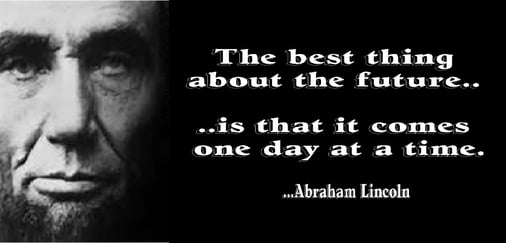 Do you recognize yourself in Abraham Lincoln? I certainly recognize my customer.
Do you recognize yourself in Abraham Lincoln? I certainly recognize my customer.
If you do, then you embrace challenges and obstacles. You love it because it’s all fuel. And you don’t just want fuel. You need it. You can’t go anywhere without it. No one or nothing can. So you’re grateful for it.
That is not to say that the good will always outweigh the bad. Or that it comes free and without cost. But there is always some good—even if only barely perceptible at first—contained within the bad. And we can find it and be cheerful because of it.
I recognized this with my battle with Acute Myeloid Leukemia. I’m sure you recognize your Will at work in your life and your business.
Growth demands Strategic Discipline.
The Discipline of Will requires you to look at challenges in your business and determine which you can control and those you cannot. Pattern Recognition is one tool through the 3 Strategic Disciplines: Priority, Metrics and Meeting Rhythms to help you identify “What is up to us, what is not up to us.” These tools dramatically improve your forecasting, alignment, and empower you to Overcome Obstacles on your path to accelerated growth.
Positioning Systems helps your business grow in the Four Decisions: People, Strategy, Execution, Cash.
Positioning Systems helps mid-sized ($5M - $250M) business Scale-UP. We help you align everyone in your business to focus on Your One Thing! To achieve growth, you need to evolve in today’s rapidly changing economic environment. Are you avoiding a conversation with yourself on how to can successfully grow your business? Contact dwick@positioningsystems.com to Scale Up your business! Take our Four Decisions Needs Assessment to discover how your business measures against other Scaled Up companies. We’ll contact you.
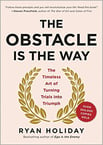 The Obstacle is the Way – Discipline #2 – Action
The Obstacle is the Way – Discipline #2 – Action
Overcoming obstacles is a discipline of three critical steps: Perception, Action, and the Will. Action is the next Discipline to share. Next blog we’ll look at Action. It’s often the step we take too soon.






.jpeg?width=150&height=135&name=Hand%20with%20marker%20writing%20the%20question%20Whats%20Next_%20(1).jpeg)

